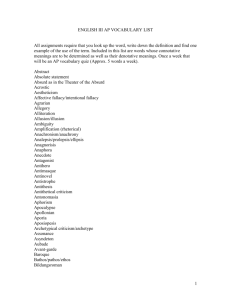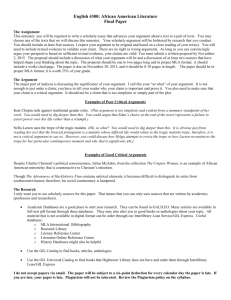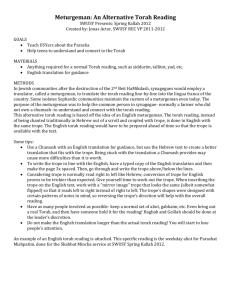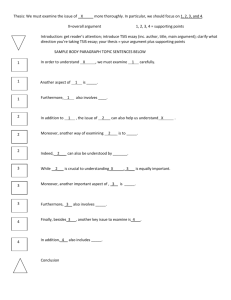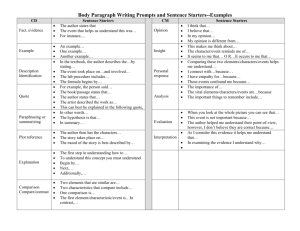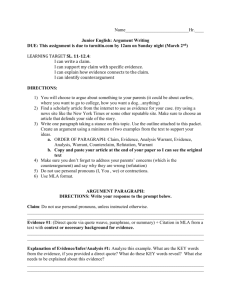Rhetorical Analysis Outline
advertisement
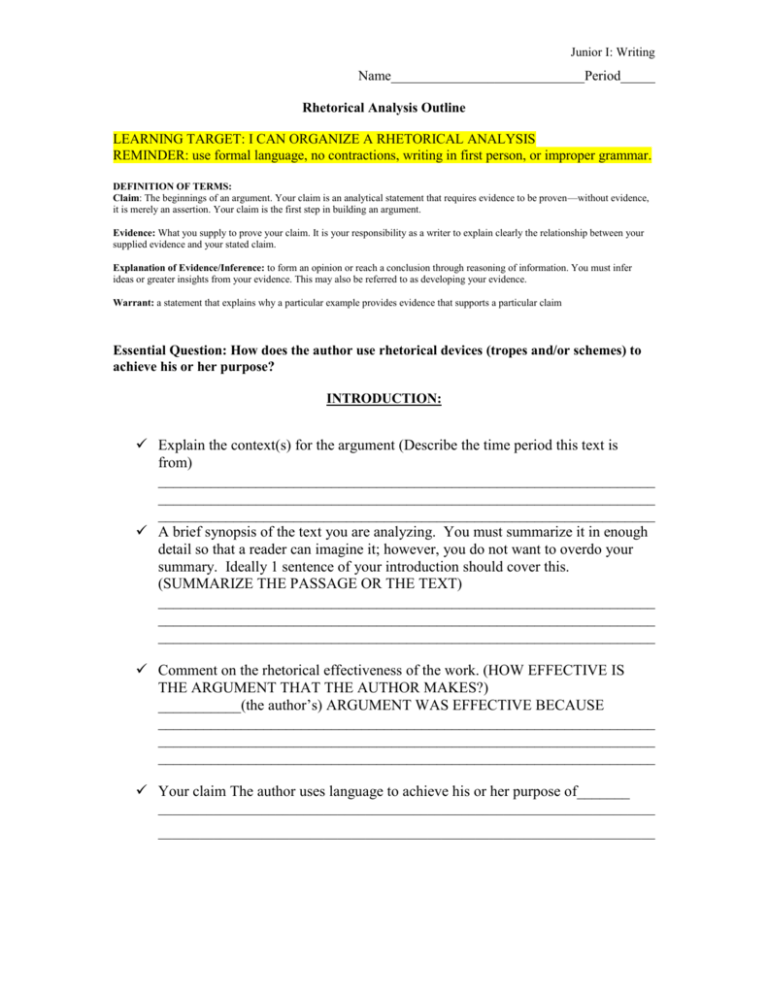
Junior I: Writing Name____________________________Period_____ Rhetorical Analysis Outline LEARNING TARGET: I CAN ORGANIZE A RHETORICAL ANALYSIS REMINDER: use formal language, no contractions, writing in first person, or improper grammar. DEFINITION OF TERMS: Claim: The beginnings of an argument. Your claim is an analytical statement that requires evidence to be proven—without evidence, it is merely an assertion. Your claim is the first step in building an argument. Evidence: What you supply to prove your claim. It is your responsibility as a writer to explain clearly the relationship between your supplied evidence and your stated claim. Explanation of Evidence/Inference: to form an opinion or reach a conclusion through reasoning of information. You must infer ideas or greater insights from your evidence. This may also be referred to as developing your evidence. Warrant: a statement that explains why a particular example provides evidence that supports a particular claim Essential Question: How does the author use rhetorical devices (tropes and/or schemes) to achieve his or her purpose? INTRODUCTION: Explain the context(s) for the argument (Describe the time period this text is from) __________________________________________________________________ __________________________________________________________________ __________________________________________________________________ A brief synopsis of the text you are analyzing. You must summarize it in enough detail so that a reader can imagine it; however, you do not want to overdo your summary. Ideally 1 sentence of your introduction should cover this. (SUMMARIZE THE PASSAGE OR THE TEXT) __________________________________________________________________ __________________________________________________________________ __________________________________________________________________ Comment on the rhetorical effectiveness of the work. (HOW EFFECTIVE IS THE ARGUMENT THAT THE AUTHOR MAKES?) ___________(the author’s) ARGUMENT WAS EFFECTIVE BECAUSE __________________________________________________________________ __________________________________________________________________ __________________________________________________________________ Your claim The author uses language to achieve his or her purpose of_______ ________________________________________________________________________ ________________________________________________________________________ Junior I: Writing FIRST BODY PARAGRAPH: 2 examples of same trope (Choose one trope that is used twice: use two examples of the same trope here) Subclaim #1: Topic sentence of this paragraph. This sentence should reflect the part of your claim that you will address in this body paragraph. (BE SPECIFIC ABOUT TROPES AND SCHEMES) ______________________________________________________________________________________ ______________________________________________________________________________________ Evidence #1: TROPE OR SCHEME (Direct quote with quote weave) + Citation in MLA from the literary or informational text with context or necessary background for evidence. ______________________________________________________________________________________ ______________________________________________________________________________________ Explanation of Evidence/Infer/Analysis #1: What are the KEY words from the trope or scheme? What do these KEY words reveal? What else needs to be explained about this trope or scheme? ______________________________________________________________________________________ ______________________________________________________________________________________ Describe how this trope or scheme helps build a development of ethos, pathos or logos. ______________________________________________________________________________________ ______________________________________________________________________________________ Warrant #1: How does evidence #1 (trope or scheme) support your claim? How does this evidence prove the position you have taken? (Do not use the words “my claim” in the warrant). ______________________________________________________________________________________ ______________________________________________________________________________________ Transition between evidence #1 and evidence #2: Refer to transition word list for more ideas. Evidence #2: TROPE OR SCHEME (Direct quote with quote weave) + Citation in MLA from the literary or informational text with context or necessary background for evidence. ______________________________________________________________________________________ ______________________________________________________________________________________ Explanation of Evidence/Infer/Analysis #2: Pick a trope or scheme to use as evidence. What are the KEY words from the evidence, if you provided a direct quote? What do these KEY words reveal? What else needs to be explained about this trope or scheme? ______________________________________________________________________________________ ______________________________________________________________________________________ Describe how this trope or scheme helps build a development of ethos, pathos or logos. ______________________________________________________________________________________ ______________________________________________________________________________________ Warrant #2: How does evidence #2 support your claim? How does this evidence prove the position you have taken? (Do not use the words “my claim” in the warrant). ______________________________________________________________________________________ Concluding Sentence: Restate your claim and compare your two major pieces of evidence using fresh language. ______________________________________________________________________________________ ______________________________________________________________________________________ Junior I: Writing SECOND BODY PARAGRAPH2 examples of same scheme (Choose one scheme that is used twice: use two examples of the same trope here) (Paragraph Break Here) The part of the claim this body paragraph will address. Subclaim #2: Topic sentence of this paragraph. This sentence should reflect the part of your claim that you will address in this body paragraph. ______________________________________________________________________________________ ______________________________________________________________________________________ Evidence #3: TROPE OR SCHEME (Direct quote with quote weave) + Citation in MLA from the literary or informational text with context or necessary background for evidence. ______________________________________________________________________________________ ______________________________________________________________________________________ Explanation of Evidence/Infer/Analysis #3: What are the KEY words from the evidence, if you provided a direct quote? What do these KEY words reveal? What else needs to be explained about this trope or scheme? ______________________________________________________________________________________ ______________________________________________________________________________________ Describe how this trope or scheme helps build a development of ethos, pathos or logos. ______________________________________________________________________________________ ______________________________________________________________________________________ Warrant #3: How does evidence #3 (trope or scheme) support your claim? How does this evidence prove the position you have taken? (Do not use the words “my claim” in the warrant). ______________________________________________________________________________________ ______________________________________________________________________________________ Transition between evidence #3 and evidence #4: Refer to transition word list for more ideas. Evidence #4: TROPE OR SCHEME (Direct quote with quote weave) + Citation in MLA from the literary or informational text with context or necessary background for evidence. ______________________________________________________________________________________ ______________________________________________________________________________________ Explanation of Evidence/Infer/Analysis #4: Pick a trope or scheme to use as evidence. What are the KEY words from the evidence, if you provided a direct quote? What do these KEY words reveal? What else needs to be explained about this trope or scheme? ______________________________________________________________________________________ ______________________________________________________________________________________ Describe how this trope or scheme helps build a development of ethos, pathos or logos. ______________________________________________________________________________________ ______________________________________________________________________________________ Warrant #4: How does evidence #4 support your claim? How does this evidence prove the position you have taken? (Do not use the words “my claim” in the warrant). ______________________________________________________________________________________ Concluding Sentence: Restate your claim and compare your two major pieces of evidence using fresh language. Junior I: Writing ______________________________________________________________________________________ ______________________________________________________________________________________ CONCLUSION: Creatively reword/restate your claim. ______________________________________________________________________________ ______________________________________________________________________________ ______________________________________________________________________________ Make a statement about the effectiveness of the writer’s argument (The author’s argument was/was not effective because…) ______________________________________________________________________________ ______________________________________________________________________________ Connection/Synthesis: How does this claim apply to the larger world? (DOES THE AUTHOR’S ARGUMENT STILL APPLY TODAY?) ______________________________________________________________________________ ______________________________________________________________________________ ______________________________________________________________________________ ______________________________________________________________________________ ______________________________________________________________________________
